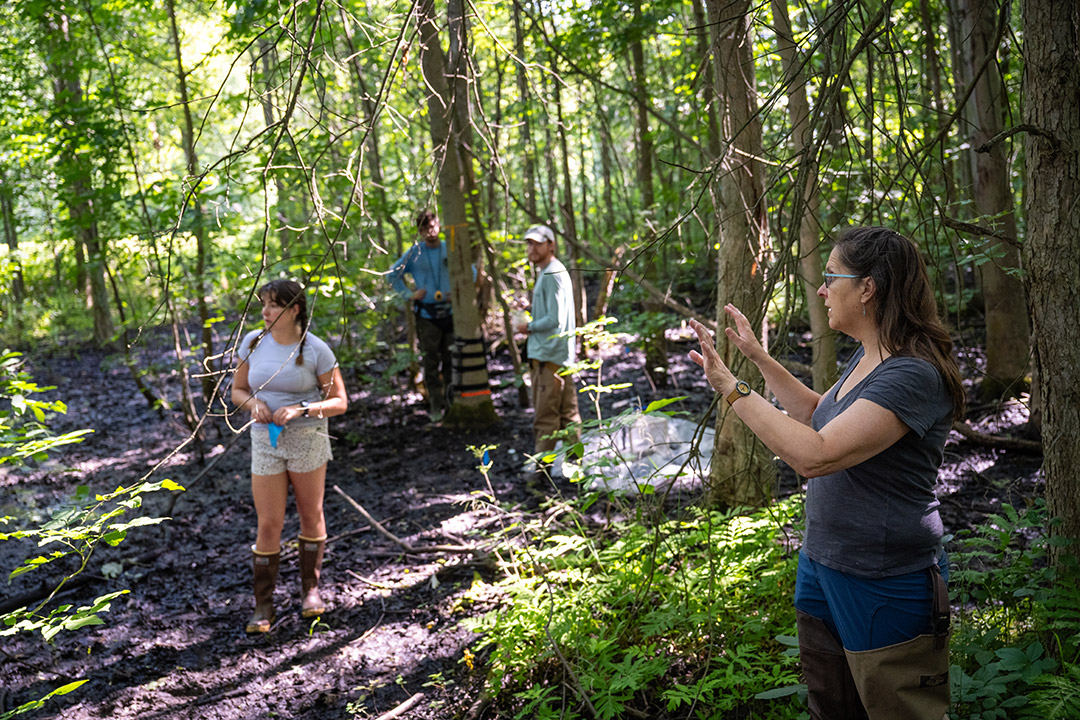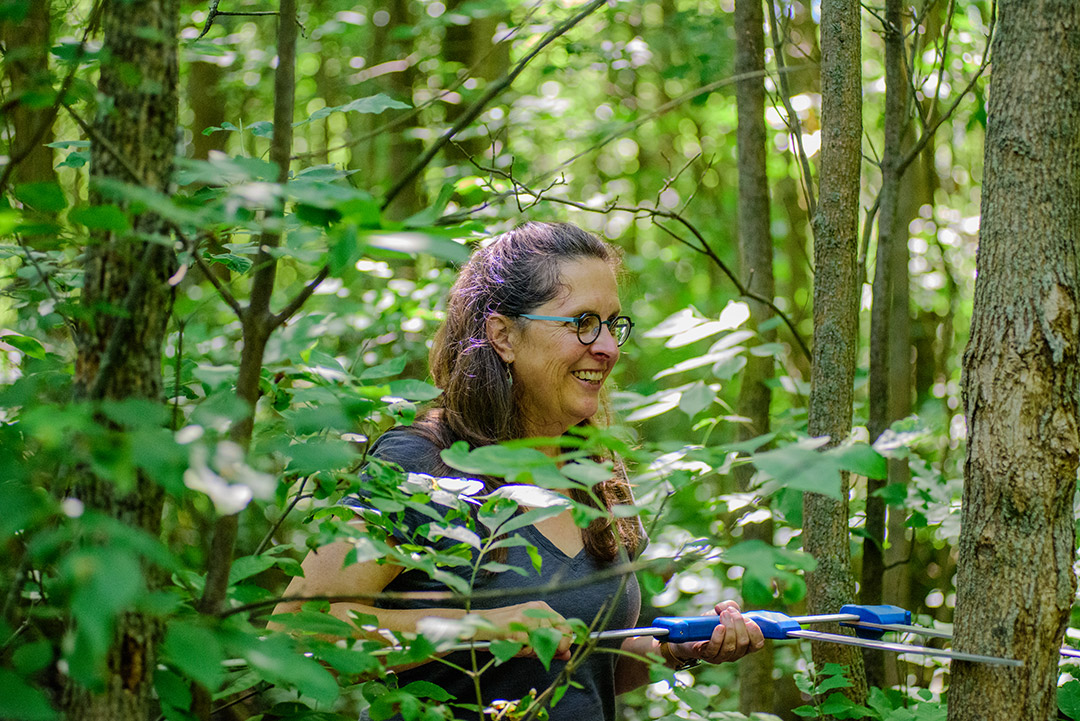Embracing philosophy and a proactive attitude in environmental conservation research
Evelyn Brister leverages humanities expertise to assist with environmental conservation research efforts
Traci Westcott/RIT
Evelyn Brister, right, jokes that she is one of few philosophers who regularly work in wader boots doing field research. Above, she works with a group of Research Experience for Undergraduates (REU) students on a project that embraces an interdisciplinary approach to wetland restoration research.
Depending on their discipline, researchers have different ways of addressing environmental problems. Biologists might focus on halting species loss, while economists investigate what people are willing to pay for renewable energy.
Professor Evelyn Brister believes that having a philosopher on research teams can help balance differing viewpoints and priorities, while also addressing ethical questions that tend to get lost in the mix.
Pete Schuck
While Brister holds a Ph.D. in philosophy from Northwestern University, she chose to obtain a master’s degree in environmental science at RIT in 2012 to better inform her current research specialty.
“Philosophers play lots of roles, and one is helping other specialists step back from their immediate projects to look at the bigger picture. When we’re talking about environmental conservation, the big picture is important,” said Brister, director of the College of Liberal Arts’ philosophy program. “We should think about global implications, as well as how these efforts make an impact over time.”
Brister’s expertise lies at the intersection of science, business, policy, and the humanities. She works with other experts to identify and evaluate conservation priorities, helping collaborators come together and maintain focus on that bigger picture. One example is her work toward reviving the functionally extinct American chestnut tree.
Brister and her collaborator Andrew Newhouse, a researcher at SUNY-ESF, argued in a 2020 publication that the wild release of genetically modified organisms can be justified as a way of preserving species and ecosystems. They use the American chestnut as a case study to support a “reorientation of conservation values” away from restoration and toward an alternative framework known as “rewilding.”
Intervening in nature is a fraught topic even among experts. Most often, if nature can recover on its own, then scientists prefer not to intervene. However, Brister explained, when the environment is rapidly changing due to climate change and other factors, the conservative approach to intervention can cause more harm than good.
“We’re in a high-risk situation when it comes to certain kinds of biodiversity loss. If we do nothing, we may risk extinction of some species, and you can’t come back from that,” said Brister. “We can all agree certain actions are too risky, but there are some interventions that warrant further thought and consideration."
Brister argued against the current “ethos of restraint” upheld by conservationists in a 2021 journal publication. Instead, she advocates for replacing this ethos with a new approach: an “ethos of responsible conservation action.” She likens this new approach, which strikes a balance between precaution and proaction, to the “do no harm” principle in healthcare.
“Doctors don’t want to do more harm than good, but sometimes you have to give a patient anesthetic, which is inherently risky, or you may have to cut off a limb to save a person’s life,” she said. “Similarly, scientists are thinking about how we balance the risks of intervention with the potential benefits as we pursue a shared goal of environmental conservation.”
While these issues can seem insurmountable, informed decision making and embracing scientific innovation can be the first step toward global environmental change. Brister is working with scientists and engineers who are exploring the use of advanced cryopreservation technologies and biobanking to help with coral reef restoration.
“The most promising way of helping coral is controlling pollution, but as we work toward that goal, cryopreservation has the potential to give nature a hand when it comes to bringing back healthy reefs,” she said.
In a new book, A Watershed Moment: The American West in the Age of Limits, Brister and her co-editors highlight issues of sustainability in the American West. The collection of essays reveals tensions between a culture of economic growth and personal freedoms, and the ecological, economic, and social constraints set by community values and the land itself. It also presents practical approaches to addressing these issues that are motivated by philosophical views on justice, quality of life, and sustainability in the American West.
“There’s a common assumption that humans are either separate from or using nature for our own purposes, but this leaves out another option—being in a caring relationship with our environment,” Brister said. “We need to fulfill our responsibilities by finding a balance and doing what we can to preserve nature.”







